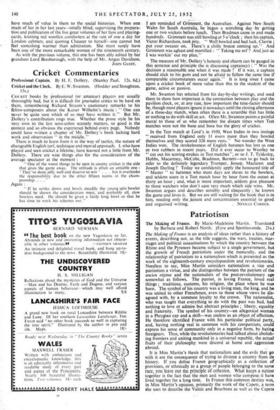Cricket Commentaries
Professional Captain. By H. E. Dollery. (Stanley Paul. 12s. 6d.) CRICKET books by professional (or amateur) players are usually thoroughly bad, but it is difficult for journalist critics to be hard on them, remembering Richard Strauss's cautionary remarks to his allow-composers about the Kaiser Wilhelm's music : " One can never be quite sure which of us_ may have written it." But Mr. Dollery's contribution rings true. Whether the prose style be his very own to the last semi-colon scarcely matters, so good is the content and so obvious the experience behind every page. Nobody could have written a chapter of Mr. Dollery's book lacking hard work and observation " in the middle."
There is much to learn from it in the way of tactics, the nature of changeable English turf, technique and mental approach. I, who have played and seen cricket a lifetime, have learned not a little from Mr. Dollery. There are wise things also for the consideration of the average spectator at the moment :
" One of the worst things to be seen in county cricket is the side
that gives the game away. The attitude is often an amiable one : ' They've done jolly well and deserve to win ' . . but it overlooks the responsibility due to the other fifteen teams in the cham- pionship. . . ."
Again :
" If he settles down and bowls steadily the young spin bowler should be shown the consideration most, and probably all, slow bowlers need. He should be given a fairly long bowl so that he has time to work his schemes out."
I am reminded of Grirrunett,, the Australian. Against New South Wales for South Australia, he began. a scorching day by getting one or two wickets before lunch. Then Bradman came in and made hundreds. Grimmett was still bowling at 5 o'clock ; then his captain, Victor Richardson, took pity. " Well bowled and bad luck, Clarrie ; put your sweater on. There's a chilly breeze coming up." And Grinunett was aghast and mortified : " Taking me orf ? And just- as I was workin' out my plan."
The measure of Mr. Dollery's honesty and charm can be gauged in this sentence and principle (he is discussing captaincy) : " Was-the decision a reasonable pne when it was made ? If it was, a captain should stick to his guns and not be afraid to follow the same line if comparable circumstances occur again." It is long since I came upon a cricket book of more value than this to the student of the game, active or passive.
Mr. Swanton has selected from his day-by-day writings, and used them to show how important is the connection between play and the pavilion clock, or, at any rate, how important the time-factor should be, though most players ignore it nowadays until the closing afternoon of a three-day match, when often there is a scramble that has little or nothing to do with skill or art. Often Mr. Swanton points a painful moral to those of us who remember the distant times when Test matches were not the bane and bore but the glory of cricket.
In the Test match at Cord's in 1950, West Indies in two innings " received from England only 11 overs more than they bowled themselves and they scored 326 more runs." No wonder the West Indies won. The strokelessness of English batsmen has lost us one or two rubbers in recent years. Did it ever occur to Woolley to " cut out his scoring strokes in Test matches", or to J. T. Tyldesley, Hobbs, Macartney, McCabe, Bradman, Barnett—not to go back to refer to the definitely legendary Trumper, Jessop, Maclaren and Joseph Darling ? Today we confidently apply the honoured title of " Master " to batsmen who most days are slaves to the bowlers, and seldom score in a Test match hour by hour from the outset at thirty an hour ; and, what is more important, seldom give pleasure to those watchers who don't care very much which side wins. Mr. Swanton argues and describes sensibly and eloquently ; he knows the game and loves it. But we are still waiting for the book that is in him, needing only the jeisure and concentration essential to good


































 Previous page
Previous page